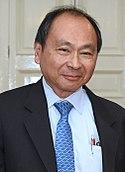Francis Fukuyama Quote
Should we then regret the fact that Latin America has not seen more violence over the past two centuries, either in the form of massive interstate wars or social revolutions? It goes without saying that the social revolutions that occurred in Europe and Asia were purchased at enormous cost: tens of millions of people killed in purges, executions, and military conflict, and hundreds of millions more displaced, incarcerated, starved to death, or tortured. Political violence, moreover, oftentimes begets only more political violence rather than progressive social change. We would not want to give war a chance in Latin America any more than in other parts of the world. These observations should not blind us, however, to the fact that just outcomes in the present are often the result, as Machiavelli noted, of crimes committed in the past. 18 THE CLEAN SLATE Exceptions to the materialist account of institutions in Latin America; why Costa Rica didn’t become a banana republic; why Argentina should have looked
Should we then regret the fact that Latin America has not seen more violence over the past two centuries, either in the form of massive interstate wars or social revolutions? It goes without saying that the social revolutions that occurred in Europe and Asia were purchased at enormous cost: tens of millions of people killed in purges, executions, and military conflict, and hundreds of millions more displaced, incarcerated, starved to death, or tortured. Political violence, moreover, oftentimes begets only more political violence rather than progressive social change. We would not want to give war a chance in Latin America any more than in other parts of the world. These observations should not blind us, however, to the fact that just outcomes in the present are often the result, as Machiavelli noted, of crimes committed in the past. 18 THE CLEAN SLATE Exceptions to the materialist account of institutions in Latin America; why Costa Rica didn’t become a banana republic; why Argentina should have looked
Related Quotes
About Francis Fukuyama
Fukuyama is best known for his book The End of History and the Last Man (1992), which argues that the worldwide spread of liberal democracies and free-market capitalism of the West and its lifestyle may signal the end point of humanity's sociocultural evolution and political struggle and become the final form of human government, an assessment met with numerous and substantial criticisms. In his subsequent book Trust: Social Virtues and Creation of Prosperity (1995), he modified his earlier position to acknowledge that culture cannot be cleanly separated from economics. Fukuyama is also associated with the rise of the neoconservative movement, from which he has since distanced himself.
Fukuyama has been a senior fellow at the Freeman Spogli Institute for International Studies since July 2010 and the Mosbacher Director of the Center on Democracy, Development and the Rule of Law at Stanford University. In August 2019, he was named director of the Ford Dorsey Master's in International Policy at Stanford.
Before that, he served as a professor and director of the International Development program at the School of Advanced International Studies of Johns Hopkins University. Previously, he was Omer L. and Nancy Hirst Professor of Public Policy at the School of Public Policy at George Mason University.
He is a council member of the International Forum for Democratic Studies founded by the National Endowment for Democracy and was a member of the Political Science Department of the RAND Corporation. He is also one of the 25 leading figures on the Information and Democracy Commission launched by Reporters Without Borders. In 2024 he received the Riggs Award for Lifetime Achievement in International and Comparative Public Administration.
